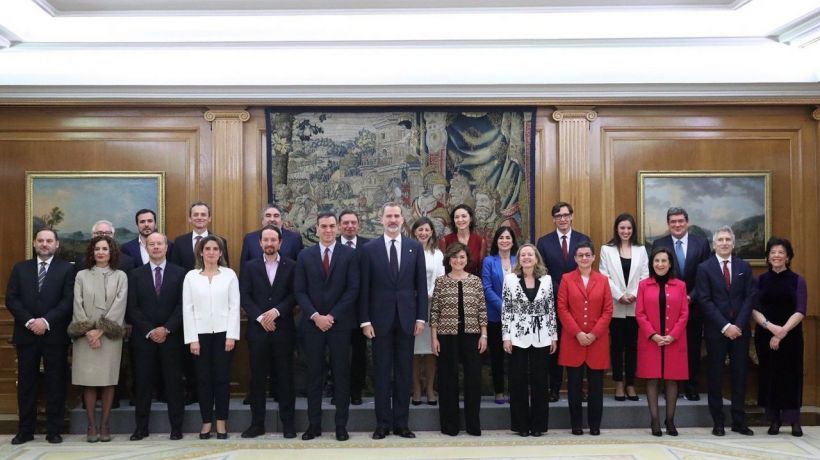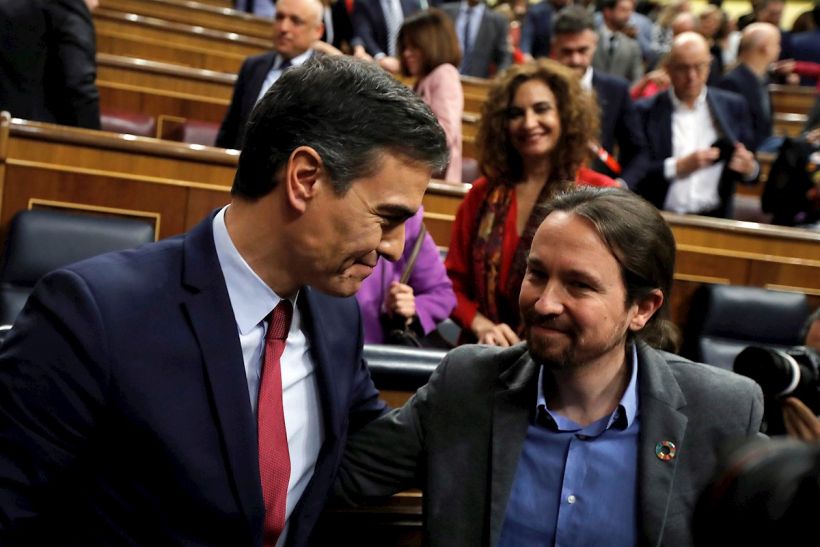
By Misión Verdad
With the entry of Unidos Podemos to Moncloa Palace [prime minister’s official residence] after an agreement with the (Spanish Socialist Workers’ Party) PSOE leader Pedro Sánchez, the first coalition government in the recent democratic history of the Spanish state has been formed. Thus, the Iberian country enters the European XXI century where government coalitions with these characteristics are common.
Even so, this arrival in the 21st century seems to remain relative: Spain is the only state of the concert of European nations where fascism has a monument (the Valley of the Fallen) and, where those who resisted Franco’s dictatorship of the extreme right, are seen as the “criminals” of the story.
And, precisely because of this anachronism, the formation of the new government has shaken the dominant elites in the Spanish state. Everything has been said: “Bolivarian Spain”, “communist government”, etc. And it’s not for nothing: the elites perceive that the bipartisan system that emerged from the 1978 transition has been officially buried, breaking [the system] with which they prevented, for five continuous decades, alternative forces to the status quo from taking positions of power.
Although this regime of power consolidated the historical power block of the ruling class after the death of the dictator Francisco Franco, it suffered a first fracture in 2011 in the context of the so called “15M” demonstrations. Podemos emerged from this context of citizen protests against bipartisanship, so its entry into the government can be seen as a kind of partial closure of the regime’s crisis that began in 2011.
It is definitely another country, with the plurinational connotation that this concept entails in the particular Spanish case.
The secretary general of Podemos, Pablo Iglesias, has assumed the vice presidency of social rights within a new government that, according to him and the program signed together with the PSOE, will take Spain to a time of democratic progress and rights protection.
But a few days after the new directors of Moncloa officially took office, the flaps began.
The block on the right, without waiting too long, and in the middle of a visceral competition for leadership, easily deployed a strategy of harassment and demolition that strongly blocks the legislature. Their first action: to project as a “state crisis” the election of the new state attorney general at the hands of Sánchez. For them, the new government has already “killed” the rule of law in Spain. The “Bolivarian communists” work fast.
The coalition government does not have it easy because of the complexity of the challenges it faces. It must navigate the territorial crisis of the Spanish state (Catalonia mainly), an economic crisis that does not end, to reverse policies of austericide and also face the dictatorship of the European bureaucracy that limits the margin of maneuverability to address social precarization.
Obviously, the Greek trauma is in the minds of many again.
Beyond the challenges that are confined to domestic politics, the current problems of the Spanish state come from a very important determination that in turn sharpens its internal contradictions to the extreme: total subordination in the geopolitical arena and the reduction of its position of force in the international order.
Both to establish a route in the conflict with Catalonia, and for the reversal of austericide and the defense of social rights against the pro-neoliberal protection of the European Union, the new government must rethink its situation as an international actor.
And this can only happen through pressure from Podemos, given the material relevance in the country that the PSOE has to stabilize the regime of 78 and guarantee the submission of Spain to the austericidal capitalism of the European Union.

Pablo Iglesias will have a Vice Presidency of Social Rights, confirmed by Spanish President Pedro Sánchez (Photo: EFE)
A decision that summarizes this dialectic of submission outside the Eurozone is the recognition by the Moncloa of the false parallel government of Deputy Juan Guaidó in Venezuela. This example of blindly following US foreign policy is a definitive example of the limited political and diplomatic capacity of the Spanish state, a fact that is reproduced, within borders, in the rosary of territorial, institutional and economic problems that it faces.
This ease with which Moncloa’s foreign policy can be altered has its correlate in other areas: in the Eurozone adjustment plans, in migratory agreements, in systematic indebtedness for the benefit of private capital.
The strategic decisions for Spain are packaged and ready to be executed from Brussels, and in the case of Venezuela, from Washington.
In this sense, Podemos must commit to its own logic of actions within the labyrinth it faces. For this, it must press for influencing foreign policy as an element of counter balance against the PSOE and the ruling elite.
This implies thinking about a new geometry of political praxis: not operating from the bottom up (the increase in the minimum wage, for example) but from the top down (being a political mediator that rivals the Trump administration’s policy against Venezuela). Changing this logic, would make possible the construction of a new scheme to interpret the moment and the balance of power: Spain’s main problem is that others decide for it, both in Catalonia and in its economic management, as in the foreign policy that “it must have” towards Venezuela.
We can think of it as a counter-power in government, and for this it is necessary to re-articulate its political grammar in terms of projecting foreign policy, not as a secondary element or away from the territoriality of the problems, but as a way of influencing the domestic policy in relation to its own program. From the outside in and not vice versa.
Undoubtedly, the systematic intoxication of the Spanish elite’s media regarding the Venezuelan situation makes it problematic to break with the orientation that Washington imposed on Moncloa to recognize Guaidó, especially in a scenario where the new government is just starting up.
But in the context of weakening the main figure of the coup in Venezuela, Podemos can take advantage by expanding the field of political interpretation: betting on imposing elections that do not exist in the [Venezuelan] Constitution or ignoring the legitimate president of Venezuela that is Nicolás Maduro, are part of an obvious symptom of how the dignity of Spain has been drained away.
And as long as that dignity does not emerge, it will be uphill to rescue pensions, the minimum wage and get Spain out of the tragedy of austerity. The idea starts from challenging the logic of transnational powers, which consists in making Spain a smaller and smaller country that decides less and less about itself, in every way. The recognition of Guaidó as “president in charge” is a clear example of the Spanish quagmire in general.
Influencing a change of direction from Moncloa to Venezuela can be an opportunity to rethink this situation, expanding the topics of polarization.
The broad social base that supports the new coalition government is neither anti-Chavista nor anti-Venezuelan, and will most likely see as a positive change that the foreign agenda be tightened up. The response of the block on the right, represented by Vox, the Popular Party and Citizens, will be automatic and aggressive, but that will not depend on changing the attitude. In any scenario, they will go against the new coalition government.
The consolidation of an anti-elite popular social bloc in Spain, which can give viability to the new coalition government, plays for its destiny outside national borders. It is from there that politics must be rethought, because the transnational ruling class that makes decisions in Spain is not dispatched from Madrid. And looking at Venezuela from another perspective is a blow to the liver expected by many.
Featured image:The new coalition government of Spain with King Felipe VI (Photo: Moncloa)
Translated by JRE/EF
- orinocotribunehttps://orinocotribune.com/author/orinocotribune/April 28, 2024
- orinocotribunehttps://orinocotribune.com/author/orinocotribune/
- orinocotribunehttps://orinocotribune.com/author/orinocotribune/April 27, 2024
- orinocotribunehttps://orinocotribune.com/author/orinocotribune/
Tags: European Union (EU) Juan Guaido Pedro Sanchez PSOE Spain Unidas Podemos US Imperialism Venezuela
Share this:
- Click to share on Twitter (Opens in new window)
- Click to share on Facebook (Opens in new window)
- Click to share on LinkedIn (Opens in new window)
- Click to share on WhatsApp (Opens in new window)
- Click to share on Reddit (Opens in new window)
- Click to share on Telegram (Opens in new window)
- Click to email a link to a friend (Opens in new window)






You must be logged in to post a comment.